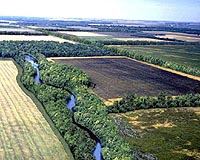| . |  |
. |
Durham NC (SPX) May 22, 2009 When the going gets rough, the tough apparently sing slower. As vegetation reclaimed formerly cleared land in California, Oregon and Washington over the last 35 years, male white-crowned sparrows have lowered their pitch and slowed down their singing so that their love songs would carry better through heavier foliage. "This is the first time that anyone has shown that bird songs can shift with rapid changes in habitat," says biologist Elizabeth Derryberry who made the finding as part of her dissertation research at Duke University. She compared recordings of individual birds in 15 different areas with some nearly forgotten recordings made at the same spots in the 1970s by a California Academy of Sciences researcher, and found that the musical pitch and speed of the trill portion of the sparrows' short songs had dropped considerably. "I was really surprised to find that songs had changed in a similar way in so many different populations." She then used archival aerial photography to see how the foliage had changed in a subset of those spots, and found that the one population whose song hadn't slowed down lived in an area where the foliage hadn't changed either. The physics is clear, but the biology is a little less certain. A lower, slower song suffers less reverberation in denser foliage and will be heard more accurately. In turn, that means it is more likely to be copied by young males who are choosing which song they will learn. Over generations, that should cause the song to slow down and drop in pitch as the foliage changes. In the short term however, Derryberry doesn't know whether the clearer song wins better territories or mates, although she does know that these changes in song do affect both male and female behavior. The results add to a growing body of evidence that the acoustic and visual communications of animals change with their habitat. "Given how much the world's habitats are changing, this is sort of an unexpected but useful factor to monitor," Derryberry said. She's now testing the broader effects of ecology on song evolution in birds across areas of South America where habitat may be changing due to deforestation and global warming. Derryberry, who earlier discovered that female white-crowned sparrows preferred the slower new songs to the chirpy old ones, is now a researcher at Louisiana State University. Her latest findings appear in the July edition of American Naturalist.
Share This Article With Planet Earth
Related Links Duke University Darwin Today At TerraDaily.com
 Beneficial Plant Spillover Effect Seen From Landscape Corridors
Beneficial Plant Spillover Effect Seen From Landscape CorridorsRaleigh NC (SPX) May 22, 2009 Research by a North Carolina State University biologist and colleagues shows that using landscape corridors, the "superhighways" that connect isolated patches of habitat, to protect certain plants has a large "spillover" effect that increases the number of plant species outside the conservation area. The study found that corridors caused such a wide range of "spillover" beyond the patches ... read more |
|
| The content herein, unless otherwise known to be public domain, are Copyright 1995-2009 - SpaceDaily. AFP and UPI Wire Stories are copyright Agence France-Presse and United Press International. ESA Portal Reports are copyright European Space Agency. All NASA sourced material is public domain. Additional copyrights may apply in whole or part to other bona fide parties. Advertising does not imply endorsement,agreement or approval of any opinions, statements or information provided by SpaceDaily on any Web page published or hosted by SpaceDaily. Privacy Statement |